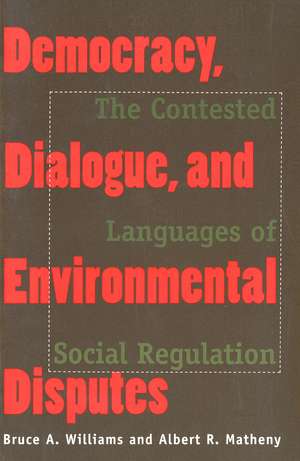Democracy, Dialogue, and Environmental Disputes: The Contested Languages of Social Regulation
Autor Bruce A. Williams, Albert R. Mathenyen Limba Engleză Paperback – 25 mai 1998
At every level of government, environmental regulation is under siege. In Washington, it has been attacked first through the "New Federalism" and now through the "Contract with America." Outside the capital, environmental regulation is the subject of controversy as state and local officials struggle with new responsibilities, threats of industry exit, and challenges from grassroots groups.
This book addresses the conundrum of regulation by tracing its source to the competing characterizations of regulatory legitimacy that have accompanied the growth of the American state. Bruce Williams and Albert Matheny identify three distinct languages—managerial, pluralist, and communitarian—used to articulate competing visions of regulation. They argue that each language posits a different understanding of the public interest and therefore a different relationship between the state, the market, and the public. Because all three languages are invoked in regulatory debates, disputants talk past one another, leaving fundamental issues of legitimacy and democracy unresolved or masked by unexamined assumptions. The authors propose a dialogic model for analyzing regulatory policymaking, drawing on postmodernist theory that claims that establishing single languages for understanding the world inevitably distorts communication. They then apply their analysis to case studies of actual environmental disputes over hazardous waste regulation in the 1980s and 1990s in New Jersey, Ohio, and Florida.
This book addresses the conundrum of regulation by tracing its source to the competing characterizations of regulatory legitimacy that have accompanied the growth of the American state. Bruce Williams and Albert Matheny identify three distinct languages—managerial, pluralist, and communitarian—used to articulate competing visions of regulation. They argue that each language posits a different understanding of the public interest and therefore a different relationship between the state, the market, and the public. Because all three languages are invoked in regulatory debates, disputants talk past one another, leaving fundamental issues of legitimacy and democracy unresolved or masked by unexamined assumptions. The authors propose a dialogic model for analyzing regulatory policymaking, drawing on postmodernist theory that claims that establishing single languages for understanding the world inevitably distorts communication. They then apply their analysis to case studies of actual environmental disputes over hazardous waste regulation in the 1980s and 1990s in New Jersey, Ohio, and Florida.
Preț: 347.61 lei
Nou
Puncte Express: 521
Preț estimativ în valută:
66.52€ • 69.95$ • 54.96£
66.52€ • 69.95$ • 54.96£
Carte tipărită la comandă
Livrare economică 17 aprilie-01 mai
Preluare comenzi: 021 569.72.76
Specificații
ISBN-13: 9780300075540
ISBN-10: 0300075545
Pagini: 272
Dimensiuni: 156 x 235 x 15 mm
Greutate: 0.42 kg
Ediția:Revised
Editura: Yale University Press
Colecția Yale University Press
ISBN-10: 0300075545
Pagini: 272
Dimensiuni: 156 x 235 x 15 mm
Greutate: 0.42 kg
Ediția:Revised
Editura: Yale University Press
Colecția Yale University Press
Notă biografică
Bruce A. Williams is associate professor of urban and regional planning and of communications at the University of Illinois at Urbana-Champaign. Albert R. Matheny is associate professor of political science at the University of Florida.
